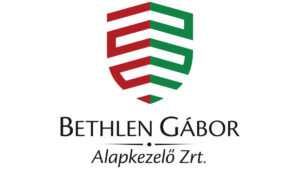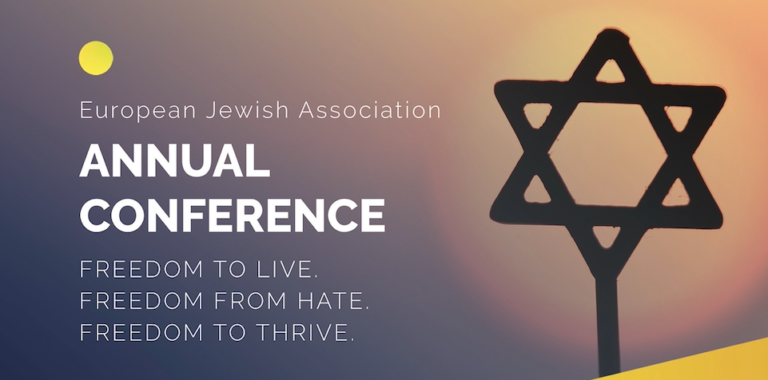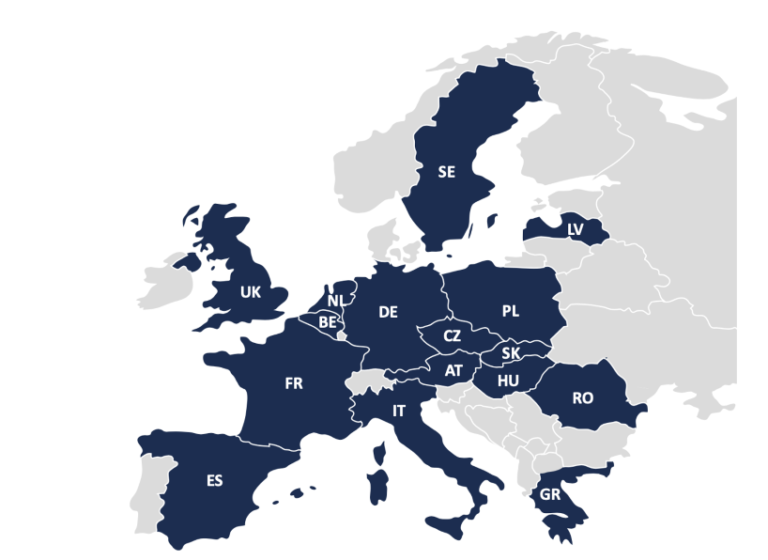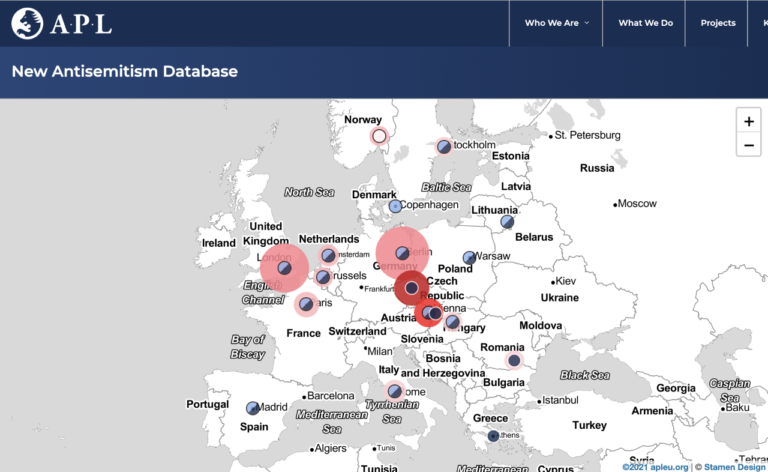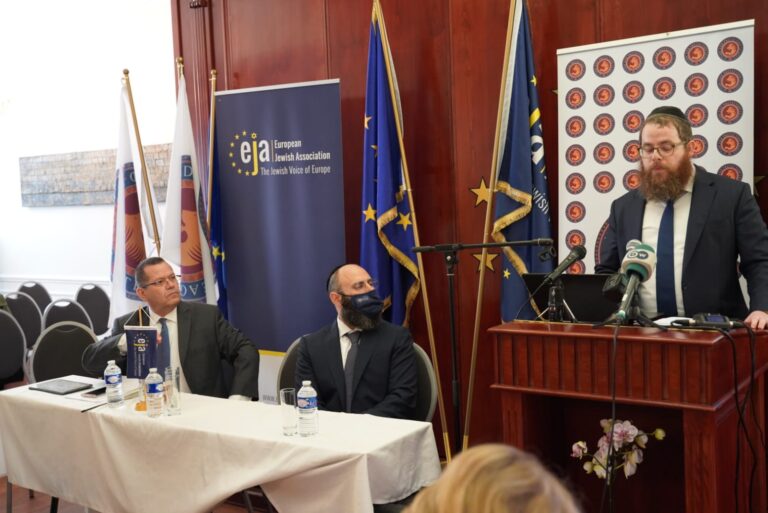


“JEWS ARE EXPLOITING HOLOCAUST, RUN SECRET NETWORKS AND WILL NEVER BE ABLE TO INTEGRATE INTO SOCIETY “
DISTURBING FINDINGS UNVEILED IN NEW ACTION AND PROTECTION LEAGUE EUROPE-WIDE SURVEY PUBLISHED AHEAD OF EUROPEAN JEWISH ASSOCIATION’S MAJOR JEWISH LEADERS MEETING IN BRUSSELS
THE LEAGUE IS CALLING FOR AN ALL COMPREHENSIVE EU ANTISEMITISM INDICATOR AND A LEGISLATIVE AND EDUCATIONAL ACTION PLAN
Israel’s’ President Mr Isaac Herzog, addressed the EJA Conference from Jerusalem:
“Europe faces an unprecedented challenge with the coronavirus. At the same time the plague of antisemitism continues to spread on the street and online. We continue to see threats to Jewish religious and cultural life in Europe including calls, legislations and judgments that support a ban on Jewish circumcision and productions of kosher meat. I urge all of you to use all of the tools at your disposal to ensure that European Jews can live an open, free and secure Jewish life. Israel will always be a home for you and will always be by your side.”
European Commission Vice-President H.E. Margaritis Schinas:
“Last year when I was with you I made you a promise to reinforce our efforts to combat antisemitism in all its forms, to support communities and to foster Jewish life in all its diversity. Last week I was proud to present the EU’s first strategy on combatting antisemitism and fostering Jewish life. We will prevent all types of antisemitism including Israel related antisemitism which is the most common form, using all the tools at our disposal. We know that Europe can only prosper when it’s Jewish communities can prosper too.”
Israeli Minister of Diaspora, Nachman Shai, promised the European Jewish leaders from Jerusalem:
“Within the new government of Israel, the voice of world Jews must be heard. We can see a direct link between antisemitism and anti-Zionism, where the cold lines of a graph spike during turbulent times in Israel, and Jews get targeted in Europe in response.”
European Jewish Association (EJA), Chairman Rabbi Menachem Margolin:
“Whilst we congratulate the European Institutions on increasing resources, expertise, and significant funding to tackle it, we are currently well behind in keeping up with its spread, as the disturbing findings from our partner’s survey shows that antisemitism is deeply ingrained in Europe, and hard to treat. Our plan to kickstart this process again involves the adoption of our ‘ten commandments’ to fight antisemitism, which will be taken forward by parliamentary working groups from across Europe.”
President of the Consistory of France and Paris and the European Center for Judaism, Joël Mergui:
“One thing is certain, while the European institutions and politicians devote significant resources and spare no effort in the fight against antisemitism, the situation in Europe is not improving. Freedom of religion for Jews is a barometer of general freedom, if Jews can fully experience their identity, so can everyone else.”
Rabbi Shlomo Koves, founder of APL and initiator of the survey:
„Jews around Europe need to propose specific action-plans to their governments as well as on the EU level. As a next step, we need to initiate an independent monitoring of antisemitic assaults in the Member States where this is still not existent.”
Dozens of prominent European Jewish leaders, Parliamentarians, and diplomats from across the continent gathered today in Brussels at the start of the European Jewish Association’s (EJA) Community Leaders Conference, including Vice-Presidents of the European Commission and addresses by the President of Israel Mr. Isaac Herzog and the Minister for Diaspora Affairs Mr. Nachman Shai.
The conference opened this morning with Europe’s Action and Protection League on combating antisemitism unveiling a new survey and an integrated database on the disturbing levels of prevalent antisemitism across 16 European countries.
EJA Conference of Jewish Leaders is the first chance for the heads of community to get together as travel restrictions are lifted, discuss unprecedented challenges and work to find solutions. “Whilst we congratulate the European Institutions on increasing resources, expertise, and significant funding to tackle it, we are currently well behind in keeping up with its spread, as the disturbing findings from our partner’s survey shows. On the back of these disturbing survey findings, there is much more to be done at a continental political level”, asserted EJA Chairman Rabbi Menachem Margolin at the conference, adding that the gathering “represents the firing of a starting gun on a stalled race against rising antisemitism across the continent.”
The conference will see the publication of a 10-point plan, “the ten commandments” by the EJA to eradicate antisemitism and the establishment of parliamentary working groups to drive this process forward:
- Encouraging and underlining to Member States that safeguarding the right of Jewish people within the EU to practice religious customs is a fundamental EU right.
- Promote educational initiatives on national curriculums underlining that antisemitism has no place in a modern and tolerant Europe.
- Allocating EU budget and encouraging Member States to set aside budget for the maintenance and support of Jewish educational facilities and places of learning.
- Encouraging Member States to support security for Jewish institutions and buildings and increasing this support at times of heightened tension.
- Pressure social media companies to act faster and more decisively on hate speech by imposing punitive and serious financial penalties when such content lingers.
- Member States to root out and/or ban NGOs or other associated groups that promote, support or tolerate antisemitism according to the IHRA definition.
- EU Funding: conditionality on commitments to fight racism, antisemitism and discrimination.
- Countries who haven’t already appointed a special envoy for combating antisemitism to do so, and additionally to set up an official committee for monitoring and combating antisemitism in national Parliaments.
9 BDS: legal safeguards against BDS on a European and a national level.
- Ban the sale of Nazi memorabilia at auctions and on websites for private individuals or entities not directly involved in educational facilities such as universities or museums.
The Action and Protection League – partners of the EJA – commissioned the survey with IPSOS SA, under the leadership of Professor András Kovács of the Central European University, Vienna-Budapest, taking in 16 European countries and asking respondents direct questions, and following up where it seemed necessary. The countries polled are Austria, Belgium, the Czech Republic, France, Germany, Greece, Hungary, Italy, Latvia, the Netherlands, Poland, Romania, Slovakia, Spain, Sweden and the United Kingdom.
Amongst the disturbing figures are:
- Nearly one third of respondents in Austria, Hungary and Poland said Jews will never be able to fully integrate into society.
- Nearly one third agreed that there is a secret Jewish network that influences political and economic affairs in the world. (Romania – 29%; France – 28%; Czech Republic – 23%).
- In Spain, 35% said Israelis behave like Nazis towards the Palestinians; 29% said the same in the Netherlands; and 26% agreed with the statement in Sweden.
- In Latvia, just over a third – 34% – said Jews exploit Holocaust victimhood for their own purposes; 23% agreed in Germany; and 22% agreed in Belgium.
- A quarter of all those surveyed agreed with the statement that Israel’s policies make them understand why some people hate Jews.
The survey complements the data on antisemitic assaults around Europe and together with additional info on the legislative and educational environment of each state, it can be incorporated into an action-plan. – the APL claims.
“Jews around Europe need to propose specific action-plans to their governments as well as on the EU level.” said Rabbi Shlomo Koves, founder of APL and initiator of the survey. “We need to take our fate into our hands if we want our grandchildren to be able to live in Europe in 20-50 years from now” – says the rabbi adding that “in order to have specific course of action, we first need a clear understanding of the current situation based on research of unquestionable integrity. This goal is served by the largest antisemitic attitude research of all time in Europe delivered by the APL. As a next step we need to initiate an independent monitoring of antisemitic assaults in the Member States where this is still non-existent.”
“Education and legislative measures as well as law enforcement practices are definitely a key to our fight for survival” – the Rabbi says.
“From the available major types of statistical data – perception, attitude and incident figures –, we propose to create a unified integrated index which is refreshed as frequently as possible. From such a sensitive indicator, we can draw conclusions regarding future best practices in education, research, legislation and security. For now, as a first step, the APL has created a new comprehensive antisemitism database that integrates existing research and antisemitic hate crime reports from Jewish communities across Europe” added APL Secretary Kálmán Szalai. “The database will be available online when the organisation opens its Brussels office on October 13, at https://apleu.org/
EJA Chairman Rabbi Menachem Margolin, who called the Conference together said:
“Whilst Europe was rightly focusing on eradicating the Covid pandemic, another virus was continuing to multiply. Antisemitism is deeply ingrained in Europe, and hard to treat. Our conference represents the firing of a starting gun on a stalled race against this old virus. We have much, much more to do at a continental political level.
Our plan to kickstart this process again involves the adoption of our ‘ten commandments’ to fight antisemitism, which will be taken forward by parliamentary working groups from across Europe.”
President of the Consistory of France and Paris and the European Center for Judaism, Joël Mergui stated:
“One thing is certain, while the European institutions and politicians devote significant resources and spare no effort in the fight against antisemitism, the situation
in Europe is not improving. Worse, it is deteriorating. It is time to face the facts. Combating antisemitism cannot be reduced to isolating and penalising antisemitic acts. This penalty is of course essential. Perpetrators of antisemitic acts should never go unpunished.
But for it to be truly effective, the fight against antisemitism must get to the root of the problem. Europe must launch concrete initiatives in the field of education to combat anti-Jewish stereotypes. It must also value the heritage and the contribution of Judaism and remind ceaselessly that Jewish spirituality is an integral part of European culture.
Europe must also commit to preserving freedom of conscience and worship. It must condemn punitive laws on the ancient religious practices of ritual slaughter and circumcision. These freedoms are the guarantors of the durability of Judaism on the Continent. They are not negotiable. Jews are a barometer of freedom: where they can fully experience their Jewish identity, so can everyone.”
Note to editors about the survey:
The survey was commissioned by the Action and Protection League, EJA’s partner organisation, and conducted in cooperation with IPSOS SA, lead by Professor András Kovács of the Central European University.
The survey offers a detailed account of the prevalence of antisemitic attitudes among the European population as a whole, and on a country-by-country basis across Europe. The research is based on responses to 70 questions and follow-up interviews of 1,000 individuals in 16 EU countries with significant Jewish communities: Austria, Belgium, the Czech Republic, France, Germany, Greece, Hungary, Italy, Latvia, the Netherlands, Poland, Romania, Slovakia, Spain, Sweden and the United Kingdom.
The new database and index present each country’s antisemitic prejudices, relations with Israel and Holocaust remembrance initiatives. They analyse the well-being and perceived safety of members of each country’s Jewish communities, and chronicle verbal and physical antisemitic hate crimes committed in each country. Based on the survey, the APL hopes to develop a new comprehensive antisemitism index for all of Europe.
For additional information please contact:
Nir Natan at: [email protected] , +972-509535123
For additional information on the survey and APL please contact:
Itzhak Belenkiy at: [email protected], +972-548175424
The Action and Protection League is supported by the Bethlen Gábor Fund.
